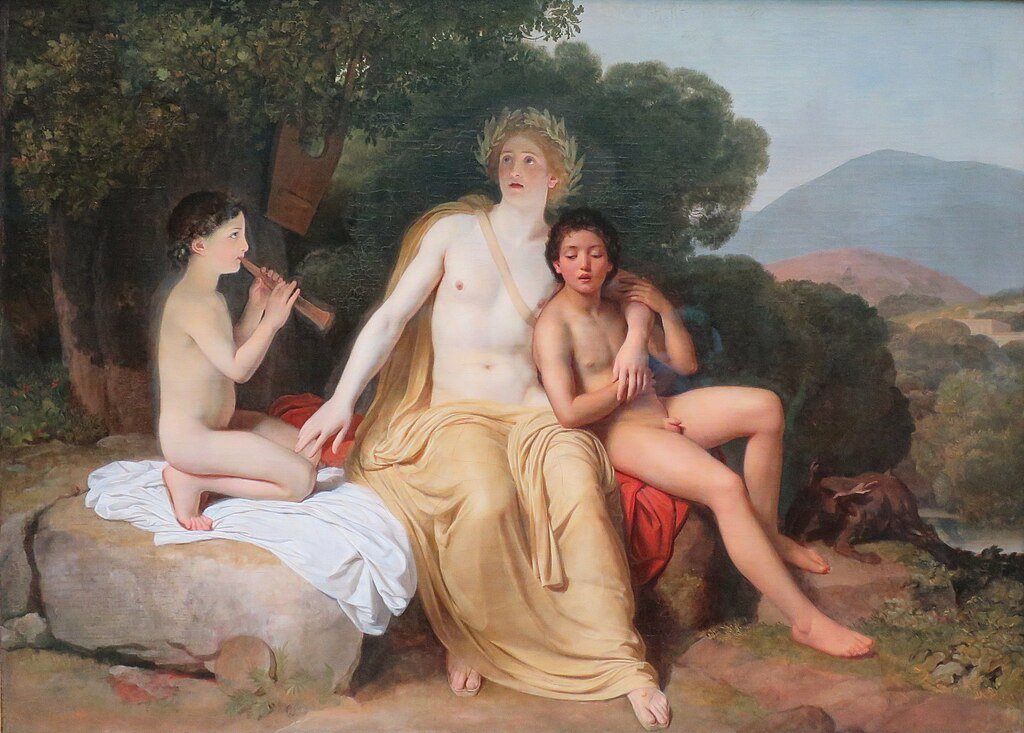A fascinating myth that marked the beginning of the typical pop culture tales of pure love in our modern society is one of the ancient Greek romances depicting a homosexual relationship. which is considered to be one of the important aspects of Greek and Roman religion and their myths. According to Greek mythology, it was a romantic relationship between two different creatures, involving, Apollo was the god and Hyacinthus, an ordinary human being

But, unfortunately, due to an accident, this love tale came to a tragic end, with the human partner Hyacinthus dying at the hands of his own lover Apollo at the end. In the memory and his neverending love for his partner Hyacinthus, Apollo made flowers grow up from the spilled-up blood of his partner.
The Characters
Apollo: Apollo is one of the most well known and major god in the ancient Greek pantheon. He is known for being the Olympian god of the sun. He was also associated with art, culture, and music.His appearance is described as that of a young, fair–haired man. According to the sources, he always used to carry a musical instrument called a lyre with him, which can be easily spotted in various paintings based on the myths around Apollo. According to Greek mythology, Apollo is considered to be the son of the god Zeus and the titan Leto.
Hyacinthus: Hyacinth, or Hyacinthus as of he is often called in Greek mythology was a human being who was associated with the Greek city state of Sparta. He is believed to be the grandson of Lacedaemon . It is believed that Hyacinthus was reborn as a flower after his death, from which the vibrant hyacinth flowers got their name.
Love Affair of Apollo and Hyacinthus
According to the mythical sources, this tale of love began with an obsessive crush of the god Apollo over the ordinary human being Hyacinthus. It is believed that Apollo was struck by the hyacinth’s beauty and immediately fell in love with him. As time passed, they became friends and then eventually lovers.
Apollo also taught Hyacinthus to play the musical instrument lyre, which he always used to carry along with him and the tricks to hunt using a bow and an arrow. Much to Apollo’s distress, hyacinth was beloved by several others, including Thamyris, Boreas, the god of the north wind, and Zephyrus, the god of the west wind who were also infatuated by the beauty of hyacinth.
However, as per the myth, Hyacinthus loved Apollo the most among all his suitors. Having fallen head over heels for the mortal man Hyacinthus, the god Apollo gives up his shrine at Delphi, his famous lyre, and his bow and arrow, to spend all his time with his new love.
he relationship between Apollo and Hyacinthus was an important part of Greco Roman religion and myths, emerging alongside the establishment of Classics as a popular topic of study in the last few centuries. However, with such an emergence, certain elements were deemed incompatible with society at the time, particularly given the enshrinement of Greece and Rome as cultural pinnacles.
Death of Hyacinthus
Although there are various descriptions in the Greek mythology and scriptures describing the death of hyacinthus through different theories. One theory believed , that when the couple was having a friendly competition of discus throwing, then Apollo makes a throw that cuts the clouds.
Hyacinthus, who was trying to impress his godly love, tries to outdo him. Sadly, as all mortals who go up against a god find out, trying to beat gods almost always ends in disaster. After a powerful throw from Hyacinthus, the discus bounces back against the ground and strikes him dead.
Whereas, the alternate vesion of the myth states that the death of Hyacinthus is instead caused by the jealousy of the god Zephyrus. In this version, Zephyrus also falls for the young man and becomes enraged when he chooses Apollo. In his jealousy, the god sends a gust of wind to deliberately send the discus flying into Hyacinthus, thus killing him.
Several alternate versions about how Apollo mourned Hyacinthus also exist, with the most popular being about the god bringing about the hyacinth/iris flowers from his Spartan lover’s spilled blood. Then it is believed that, as a testament to his love Apollo promises to sing about Hyacinthus in his songs and to turn him into a flower. As he is speaking over the body, a deep red flower blooms with the sounds of mourning written in its petals.
Festival of Hyacinthia
The festival of Hyacinthia in Amyclae is the second most significant Spartan celebration. It commemorates the death and rebirth of Hyacinthus, unfolding over three days in the Spartan month Hyacinthius during early summer.
The first day was dedicated to mourning with solemn sacrifices and austere banquets, emphasizing simplicity. The second day marked the joyous celebration of Hyacinthus’ rebirth, featuring musical performances, horse races, and spirited choirs. Parades of adorned carts, crafted by Spartan girls and women, traversed Amyclae, while sacrificial offerings, mainly goats, and festive banquets ensued. Helots and foreigners were welcomed participants.
The final day, possibly a more solemn affair remained undescribed. Spartan women contributed by weaving a chiton, symbolically presented to the god, a tradition reminiscent of Athenian rituals during the Panathenaic Games.
Summary and the Theme of The Myth of Apollo and Hyacinthus
The myth of Apollo and Hyacinthus is a celebration of male love, the story that shows that how the gods often desire to be a part of the human world. Although Hyacinthus is not a god, Apollo wants to bring him up to the heavens. First, , he tries to participate in Hyacinthus’s daily life. Eventually, Apollo clumsily tries to contain his power but, ultimately ends up killing the boy he admires, showing how the gods’ attachment to the human world is their weakness.
